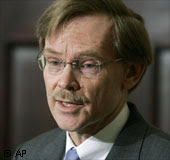
Lionel Laurent
LONDON -
The World Bank may prefer to cultivate a reputation as a caring, sharing institution that doles out loans to less well-off countries, but it also knows when to stand firm--especially when dealing with countries that don't pay back their debts.
On Tuesday the World Bank remained resolute in its position regarding the ruling junta of Myanmar, which is stubbornly refusing to allow Western aid workers the freedom of action needed to deal with the havoc and destruction of Cyclone Nargis. The World Bank claimed it could not give loans or aid to Myanmar even if it wanted to--because Myanmar has not repaid its debts over the past decade.
"'The bank cannot legally provide any resources to Myanmar because it is in arrears with the Bank since 1998," World Bank Managing Director Juan Jose Daboub told the press. "At this time, we are not in a position of providing resources to Myanmar."
This is not the first time the World Bank has had to refuse loans to an indebted country in crisis. Throughout the 1980s and 1990s the institution was one of many to avoid helping Liberia, which ended up accumulating $458 million in debt to the World Bank because of civil war and dysfunctional governments.
But when Ellen Johnson-Sirleaf was elected as Liberia's president in 2005, the World Bank teamed up with the International Monetary Fund to help cancel Liberia's outstanding debt. World Bank president Robert Zoellick even praised the election of Johnson-Sirleaf as a sign that Liberia was moving down a path of "peace and development"; the new president's determination to re-engage with the international community helped secure donations and confidence in the country's future.
A spokesman for the World Bank told Forbes.com that it did not make sense to throw good money away on bad governments, and that only when there was a semblance of political progress could the institution move to try and clear the arrears. "We are forced to work with the existing institutions," he said. "And if there is no political will to engage with the bank or the international community, as demonstrated by Myanmar, then there is nothing we can do."
There could be a glimmer of hope going forward, however, following the junta's decision to approve a visit by United Nations Secretary-General Ban Ki-Moon. Myanmar's government is also reportedly looking to organize a foreign aid conference in Rangoon to promote international assistance.
Thomson Financial contributed to this article.
Rest of your post
ကိုယ်ကျင့်တဲ့တရား ကိုယ့်တရား
-
ငယ်ကတည်းက အယူအဆတွေ အဓိပ္ပါယ်ဖွင့်ဆိုချက်တွေနဲ့ပတ်သက်ရင် အလွယ်တကူ လက်မခံဘဲ
သေချာ စဉ်းစားပြီး ကိုယ်တကယ်ယုံနိုင်မှပဲ လက်ခံတတ်တဲ့ ဉာဉ်ရှိသူမို့ ..
ဘာ...
5 months ago






















No comments:
Post a Comment